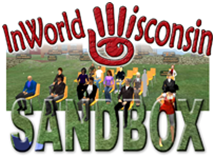UW-System faculty and instructional staff are invited to participate in two free Second Life “in-world” workshops featuring speakers who are experts at using Second Life for education. See details on sessions and registration.
The sessions are funded by the UW- System Learning Technology Development Council Curricular Redesign Grant awarded to UW-Whitewater. The grant supports exploration by faculty into the educational advantages offered in the virtual world of Second Life for teaching and learning. UW-Whitewater faculty and staff members working on the grant project are using a learning community model to explore and experience how the virtual world can enhance teaching and learning. To learn more about the learning community, please join us and attend our UW-System Presidential Summit session on Friday, April 15 at 8:30 a.m. Seven of the learning community members will be there to discuss and show how: “Second Life Faculty Learning Community Spurs Imagination.”
You may participate in one or both of the following sessions. To register, sign up at: http://geturl.uww.edu/0ud
A Second Life account and an avatar are required to participate. SLURL location and other participation information will be e-mailed to those who register.
Date: April 19, 2011
Time: 8 a.m. to 9:15 (CST)
Title: Virtual Worlds: What are the best uses? Where do we go from here?
Speaker: AJ Kelton, Director, Emerging Instructional Technology, College of Humanities & Social Science at Montclair State University; founder and current leader of the EDUCAUSE Virtual Worlds Constituent Group; and Founder and Chief Moderator of the Virtual Worlds Education Roundtable.
Description: Join distinguished Second Life expert AJ Kelton (also known as AJ Brooks in Second Life) for an informal discussion on virtual worlds, including what to expect, how to make use of the medium, and how to move forward working in a virtual environment. AJ will share what he has discovered from his own teaching experiences and the instructors he works with at Montclair State University. He will share best practice examples and then open the discussion for questions.
Date: May 3, 2011
Time: 8 a.m. to 9:15 (CST)
Title: Tools to create engaging and experiential learning in Second Life
Speaker: Cheryl Davis, Technology Consultant, Hazelwood MO School District and Instructor, Fontbonne University
Cheryl is an advocate for using Second Life in both higher education and middle/high school levels. She teaches several graduate-level courses at Fontbonne University in St. Louis, MO about digital and social technologies in the Master of Science in Computer Education Program. These include several courses on how to utilize Second Life for teaching and learning. She is also a Curriculum/Technology Consultant for the Hazelwood School District in Florissant, MO.
Description: Cheryl will discuss and show how she uses Second Life in her classes to create engaging and experiential learning. She will also provide a tour and demonstration of at least 10 practical educational tools available in Second Life. Most are free and will be offered to session attendees. Cheryl will also discuss the use of a few free simple scripts that can be modified to create simple games and activities in Second Life.


